- Home
- David Dalglish
The Broken Pieces Page 2
The Broken Pieces Read online
Page 2
“Hope,” Jerico said. “I offer hope.”
“Hope?” Kaide asked, looking over his shoulder. “I don’t see any hope in your eyes. I don’t hear any hope in your voice. You’re living a lie, Jerico, and I want no part of it. Luther was right. You should go off into the wilderness and die. There’s no hope left in this world, just a lot of tears and blood.”
Kaide descended the hill. Jerico watched him go, his gut wrenched into a knot. More than ever he wished he could say something, offer something, cleanse away the man’s anguish for his sister with a simple prayer. But instead he heard the words, the accusations, and as the clouds passed over the moon, darkening the land, Jerico dared wonder.
When the sun rose, and the army below stirred in preparations for another day’s march, Jerico remained upon the hill, still awake, still in doubt.
Grevus stepped into the tent, then waited at the entrance with his hands clasped behind his back. His dark armor was polished to a fine gleam, the lion on his breastplate intricately detailed so that it seemed its fur blew in an unseen wind. Sheathed at his side was his well-worn blade. For twenty years he’d served as a paladin of Karak, and in those twenty years, he’d never met a priest more frightening than Luther.
“You called for me?” he asked when Luther turned from his candlelit desk. A parchment lay before him, an inkwell beside it. Luther put away the quill he held, then gestured to what he’d written.
“I have a message for you to deliver,” the priest said. “One that, given the circumstances, might put your life in peril.”
“My life belongs to Karak,” Grevus said. “I shall do whatever he commands without fear or doubt.”
“Fear itself is irrelevant,” Luther said, turning back to the parchment and scanning over it. “It’s how you act upon it that matters. Doubt, however, is poison. I say this only to ensure you are careful, and remain guarded. This is a most delicate task, more than just delivering a message.”
Grevus hated the cryptic words but knew better than to demand a proper explanation. If Luther wished to give him one, he’d do so on his own terms.
“I will do as I must,” Grevus said. “Where am I to go?”
“To the Blood Tower,” Luther said, letting out a sigh.
Grevus swallowed, everything clicking in place.
“To Cyric,” he said.
“Yes, to Cyric,” Luther said. “This must be handled delicately. I’ve already sent a missive to Mordeina, requesting the full force of our might to come north under my command. So far none of them know of Cyric’s claims to be Karak made flesh, and I’d like this settled without them ever knowing.”
“You fear they’ll condemn him, and risk war amongst ourselves?”
“Condemn? No, Grevus, I fear that my brethren will believe him. The only thing worse than a madman is a madman with followers.”
Grevus felt his body stiffen. Luther was the most faithful, intelligent priest he’d ever known, hence why he feared him so. He knew Karak’s every desire, and when he spoke, it was with the voice of the Lion. If he was afraid of Cyric’s claim, and the damage it might cause…
“So you don’t believe him then?” Grevus asked.
Luther shot him a look.
“Believe him? Of course I don’t believe him. That you have to ask makes me reconsider sending you as bearer of my message.”
“Forgive me,” Grevus said, bowing low. His mind scrambled for the right words. He thought back to his days at the Stronghold, particularly the weeks spent reading over prophecy before returning to the physical training and prayers. “But every child of Karak has been told there will be a day when our god walks the world as he once did. When the sun rises, we pray today is that day, so our hearts may be ready, and our faith strong enough to kneel in his presence without shame.”
“Grevus, I trust you above all others,” Luther said, and the worried look on his face made Grevus uneasy. “You are a simple man, faithful, practical. If you are uncertain about Cyric’s claim, then I fear all the more how the rest of our brethren will react.”
“You misunderstand me,” Grevus said. “I believe that Karak might one day walk this world. What I do doubt, however, is that he’s Cyric.”
“You speak of doubt yet again. Be certain, or admit you know nothing. Never doubt.”
The ink dry, Luther rolled up the message, then began melting wax so he might form a seal. Grevus watched, the tent feeling incredibly cramped despite its large size. The air was suffocating, he realized, though he was unsure why. Maybe it was Luther’s worry that infected him. Grevus felt best walking into a conflict with his sword drawn and his armor shining. That was his home, on the battlefield, the heathens and the blasphemous dying upon his blade. Philosophy? Prophecy? They appealed to him, but only as a curiosity. Debating them, on the other hand, made him feel like he was on a different battlefield, naked and fighting with his bare fists.
“He was a good disciple,” Luther said, interrupting his thoughts. “Good, but there was a flaw in him, one I tried to repair. But some flaws are too deep. Some flaws define who we really are.”
“And what might that be?” asked Grevus as the wax dripped upon the message he was to bring north. “What was Cyric’s flaw?”
Luther smiled sadly and shook his head.
“He hated the priesthood.”
Grevus’s mouth dropped open. That was a flaw? That sounded more like a massive contradiction for a young man determined to be a priest.
“I’m…not sure I understand.”
Drip, drip went the wax.
“It’s not that hard,” Luther said, carefully watching it collect. “A subtle thing, really. But the priesthood, its laws, its restrictions, all of its members…he saw them as beneath him. He saw them as failing to live up to Karak’s standard. Whenever he failed, he’d blame not himself but the priestly order. It was we who taught him weakness, was it not? No, he always looked to the old ways. That was his excuse, his reason for the flaws he saw in all of us. We didn’t sacrifice sinners like we used to. We tolerated too much. We weren’t as strict, weren’t as demanding. So much easier for him to yearn for a past that was better, more full of faith and wisdom.”
Grevus tried to think like that, to understand, but could not. The past was the past, nothing better, nothing worse.
“In all times, there are men who are faithful, and men who are weak,” he said. “Cyric is a fool to think it wasn’t always this way.”
Luther smiled as he put down the candle and wax.
“So true, paladin. Thank you for reminding me why I chose you.”
He pressed his ring into the wax, placing his seal upon it.
“Ride alone to the Blood Tower,” Luther said, offering the missive to him from his seat. Grevus accepted it, hoping the priest didn’t notice his nervousness. Even through his gauntlets, it felt like the paper shocked his skin. “If Cyric is not there, he might be at a nearby village named Willshire. When he is alone, break the seal and read him my message.”
“Shall he not read it himself?” Grevus asked.
“No, no. From your lips, Grevus. I want there to be no doubt, no confusion. I trust you to believe what I say, and to know what to do after the message is delivered. Act with faith, and do not hesitate. There is more at stake here than you know.”
“And what is that?” Grevus dared ask, even if it revealed him to be lacking in wisdom.
Luther leaned back into his chair, and his eyes glazed over as his thoughts traveled inward.
“A man who yearns for the past now claims to be Karak,” he said. “A man who would make things as they once were. His faith is strong, and his words will be seductive. He’ll speak of power, of conquest and subjugation. He’ll speak of enforcing faith throughout the land, denying people even the illusion of choice. And if given the chance he’ll crush every last remnant of our order, which he views with such contempt, all to remake a world that never existed except in his foolish dreams.”
“The words I
carry, they are the words of Karak?” Grevus asked, looking at the parchment.
“They are,” Luther said, his eyes refocusing. “And if they are not, they should be. Prepare your things quickly, and ride out before the dawn.”
Grevus bowed low, but had one last question before he left.
“Luther,” he said. “I must ask. I must. If Cyric claims he is Karak made flesh when he is not, then he speaks blasphemy of the highest order. You know our law. You know what I am called to do.”
Luther stood from his chair and walked over, putting his hands on his shoulders.
“Read the message,” he said. “And then act with the wisdom and faith I know you have.”
Grevus’s insides hardened, and despite all his training, he felt fear and uncertainty facing such a task. To judge the life and faith of a priest, knowing that blood must be spilled should he not deny the blasphemy…
“I will do my best,” he said, standing up straighter.
“I know you will. Now go.”
As Grevus went to leave, Luther gave him one last command.
‘Oh, and while you’re up there,” he said, his old eyes sparkling, “should you find out where Darius is hiding, hunt him down and kill him. An embarrassment like that to our order has no right to live.”
“Of course,” Grevus said, bowing low. He felt a smile pull at his lips. Everything else might worry him, especially being caught between two powerful priests of Karak, but in this, he knew there was no debate.
Darius, the traitor paladin, deserved to die.
3
The people of Willshire rose with the sun, for there was work to do. For them, it meant dealing with the fields, their homes, with baking bread and dirty clothes. For Darius, it was an execution.
The paladin strode from his tent toward the town square, the new day sun shining off his polished armor. Where once had been the sigil of Karak was now a golden mountain. It’d taken many meticulous hours scraping away at it with a dagger to clear off the original paint, and his drawing, while careful, was still crude. Skill in art had always eluded Darius growing up, not that he’d had much practice beyond a few doodles made while learning his letters in the Stronghold. But he was proud of it nonetheless, though it now worried him greatly. He bore the symbol of Ashhur on his chest, but on his face he would wear the hood of the executioner.
An older man, Brute, saw him along the path through town and strode to join him.
“It doesn’t have to be you,” Brute said.
Darius shook his head.
“You know it does.”
They continued on, neither speaking. After the defense of Willshire and the arrival of Daniel Coldmine’s soldiers, they’d remained in town. They’d fortified the outer roads and built up some barricades, but not with any real expectation of defense. In truth, they’d not known what else to do. Daniel himself was lost, presumed dead after a failed attack on the Blood Tower. Once casualties were counted and done, Brute had assumed leadership, though only in name. Darius had become their leader after that battle. He’d defeated Cyric and sent him running, and it was his sword that had killed the demon lion, Kayne. They looked to him, expecting a miracle that Darius simply did not have to offer.
“It shouldn’t be you,” Brute said, finally breaking the silence as the square came into view. “This man is one of mine. Crimes committed by soldiers should be tried, judged, and punished by other soldiers.”
Darius heard the words, and a large part of him wanted to accept. Brute had quickly become a good companion, offering advice earned from many long years of battle. His gray hair and numerous scars weren’t needed to convince Darius that his wisdom was more often correct than not. But this, he had to do.
“Who gave the order that the people of Willshire were to be untouched?” Darius asked.
“You did, but…”
“And,” Darius continued, “who warned Conn that if he forced himself on another woman, he’d have a choice, his prick or his life?”
Brute shook his head.
“You did, but you had no authority to make those orders, or those threats. You spoke them, but I made them law. Let me swing the blade. It’s not your fault.”
“I know it’s not mine,” Darius said. “It’s Conn’s. Who’d have thought the fool would rather lose the head on his shoulders than the one down below?”
To this, Brute could only shrug.
In the center of town was a great pit of ash. It was there Cyric had constructed his altar, where he’d planned to sacrifice many in the name of Karak. Once the mad priest had been defeated, Darius made sure every bit of wood and nail had been burned to the ground. Later they’d burned the bodies of the dead upon it, for they had little spare wood for the purpose, and the fire was already blazing. That the law required Conn’s execution to be held in the public square, on that same spot he’d fought and killed to prevent similar beheadings, felt bitterly ironic.
Conn waited on his knees in the center of the pit, hands bound behind his back. Two soldiers stood at either side of him, their hands on the hilts of their swords. At their arrival Conn looked up, then spat at Darius’s feet.
“Figured you’d be here,” he said. “Plan on using that big ass sword of yours?”
Conn was a fine looking man, but his heart was ugly. Twice Darius had caught him pressuring the young girls of the village to lie with him, implying harm might come to them otherwise. He’d been given warnings, but little else. Then one drunken night, not three days after they’d stopped Cyric’s sacrifices, Conn had flung a barmaid against a wall and tried to take her by force. Again Darius had stopped him, and then told Brute to declare the law. Trying to live by the forgiveness Jerico had taught him, Darius gave Conn more warnings, and every bit of hard labor he could think of around the town to keep him busy. It’d not been enough.
This time, Darius had not been there to stop him. They’d learned only from the girl’s furious father.
“You can change your mind,” Brute told Conn. “It’s not too late.”
Conn spat at his feet.
“You want me to live as half a man? That ain’t living. I’ll die whole, not like that.”
“You won’t die whole,” Darius said, pulling his greatsword off his back. Blue-white light shone across the blade, soft and subtle. It was the material manifestation of Darius’s faith, and by how weakly it flickered he could see how much his confusion had shaken him.
Conn sneered.
“Whole enough. Go ahead, unless you’re too much of a coward.”
Darius swallowed, and he tried to bury his frustration, his anger and hatred. Stepping closer to Conn, he knelt down so they could stare eye to eye. No matter what Conn was, he was not a coward, and he met Darius’s gaze without flinching for fear of what was to come.
“Don’t do this,” Darius said. His voice dropped low, as if it were just the two of them alone in the world. “There’s still a chance for you to change. There’s still a way you can make this right.”
“You want to make this right?” Conn asked. He leaned closer, his arms still bound behind his back. “Then let me go. I didn’t do nothing, and you’ve got no right mutilating me. What you said, it’s sick. Only have yourself to blame.”
Forgiveness and compassion, thought Darius. He saw neither, not in those eyes. He stood, then beckoned the guards to step away. Conn sat on his haunches instead of presenting his neck.
“I ain’t making it easy for you,” he said to the paladin. “And you,” he said, glaring at Brute. “We fought to keep that Cyric bastard from taking us over. What’s the point if we just let one god replace the other?”
“Conn Graham, you have broken the king’s law, and chosen a sentence of death,” Darius said, ignoring Conn’s snicker at the word king. “May you find peace in the hereafter.”
“Maybe I’ll find justice, too,” Conn said.
Down came the blade in a sweeping angle, chopping through Conn’s neck side to side. His head rolled, and Darius tur
ned away, not wanting to see. The two guards reached for the body, and the paladin trusted them to clean up the mess. Wiping down his sword, he placed it on his back and marched away. Brute stepped in line, following.
“We get all kinds of men for our towers,” Brute said. “Most we hammer and beat into something worthwhile, something a man can be proud of. But sometimes…sometimes we’re trying to make armor out of mud. Can’t change what a man’s made of, only improve what’s there.”
“So you’re saying Conn was mud?”
“I’m saying if you gave him a hundred chances, he’d break every one.”
Darius shook his head, troubled but not wanting to reveal why, not even to Brute.
“Then perhaps I should have given him a hundred and one.”
Brute grabbed his arm, forcing Darius to stop and look at him.
“You son of a bitch, you really are bothered by this,” he said. “I told you to let me swing the damn sword. Next time maybe you’ll listen.”
Darius opened his mouth to retort back, but then just sighed.
“Fine,” he said. “And pass your own laws, too. I’m clearly terrible at it.”
“Not so bad as you think.”
They stopped, for down the street rushed one of their men, clearly excited about something.
“He’s back,” the man said, out of breath from the run.
“Who’s back?” asked Darius as Brute raised an eyebrow.
“Daniel,” said the soldier. “Daniel Coldmine’s back from the Wedge!”
They gathered in Darius’s tent, the largest and most private in the camp. Daniel sat on the cot, a blanket wrapped about his upper body. He held several slices of buttered bread, wolfing them down and pausing only to speak. A cup of ale rested between his knees, half-empty. A small boy stood in the corner of the tent, attending him should he need more to eat or drink.

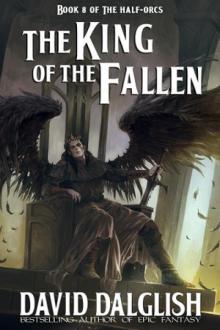 The King of the Fallen
The King of the Fallen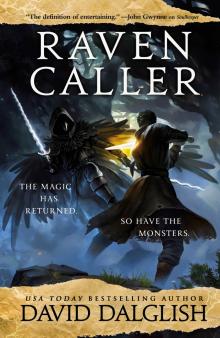 Ravencaller
Ravencaller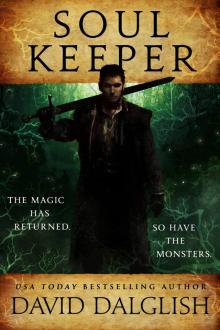 Soulkeeper
Soulkeeper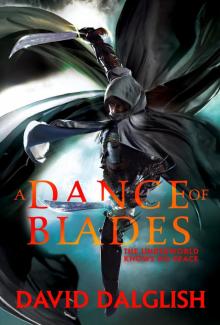 A Dance of Blades
A Dance of Blades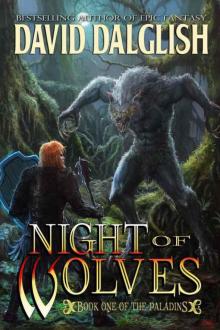 Night of Wolves p-1
Night of Wolves p-1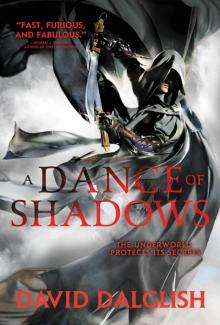 A Dance of Shadows
A Dance of Shadows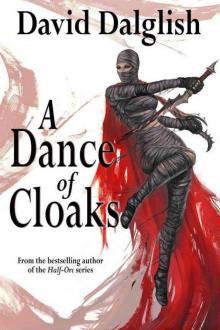 A Dance of Cloaks s-1
A Dance of Cloaks s-1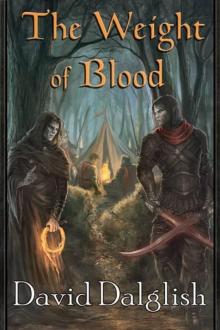 Weight of Blood
Weight of Blood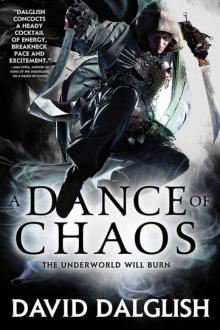 A Dance of Chaos
A Dance of Chaos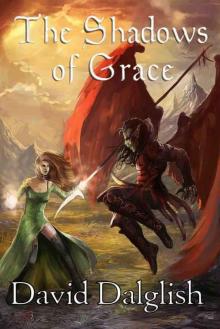 The Shadows of Grace h-4
The Shadows of Grace h-4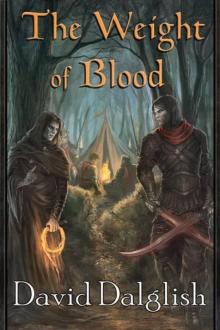 Weight of Blood h-1
Weight of Blood h-1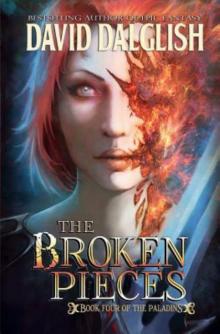 The Broken Pieces
The Broken Pieces The Shadowdance Trilogy
The Shadowdance Trilogy A Dance of Death (Shadowdance Trilogy, Book 3)
A Dance of Death (Shadowdance Trilogy, Book 3)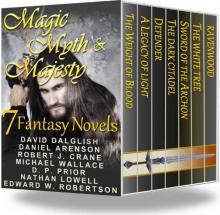 Magic, Myth & Majesty: 7 Fantasy Novels
Magic, Myth & Majesty: 7 Fantasy Novels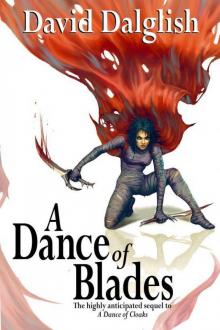 A Dance of Blades s-2
A Dance of Blades s-2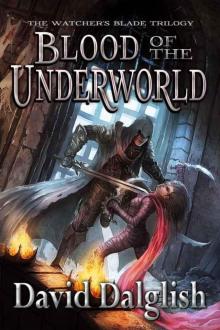 Blood of the Underworld
Blood of the Underworld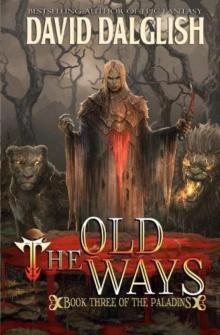 The Old Ways p-3
The Old Ways p-3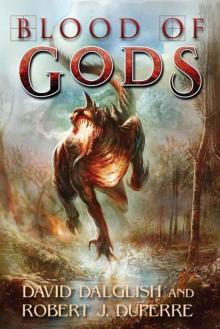 Blood Of Gods (Book 3)
Blood Of Gods (Book 3)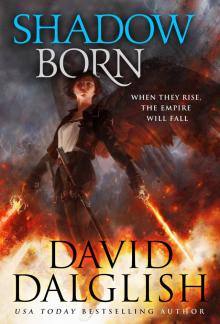 Shadowborn
Shadowborn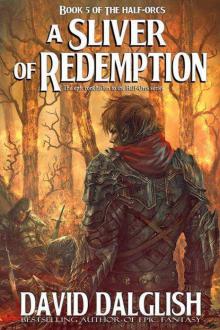 A Sliver of Redemption (Half-Orcs Book 5)
A Sliver of Redemption (Half-Orcs Book 5)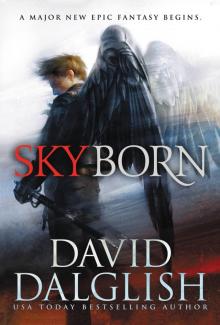 Skyborn
Skyborn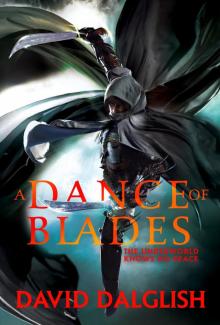 A Dance of Blades (Shadowdance 2)
A Dance of Blades (Shadowdance 2)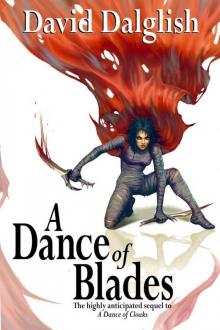 A Dance of Blades, (Shadowdance Trilogy, Book 2)
A Dance of Blades, (Shadowdance Trilogy, Book 2)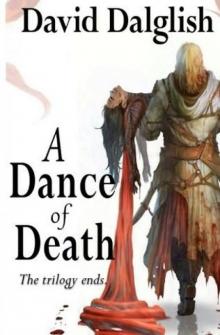 A Dance Of Death s-3
A Dance Of Death s-3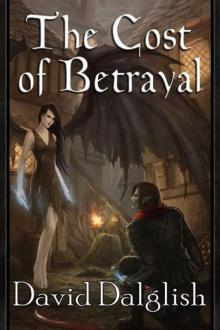 The Cost of Betrayal (Half-Orcs Book 2)
The Cost of Betrayal (Half-Orcs Book 2)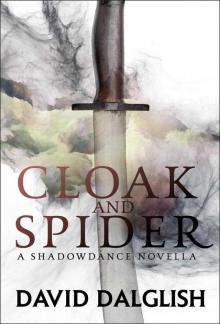 Cloak and Spider: A Shadowdance Novella
Cloak and Spider: A Shadowdance Novella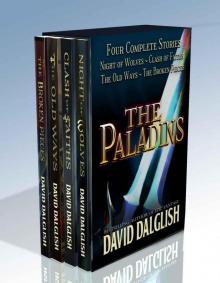 The Paladins
The Paladins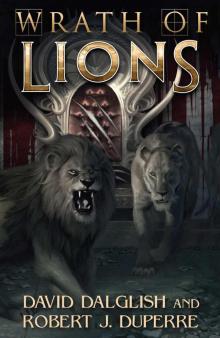 Wrath of Lions
Wrath of Lions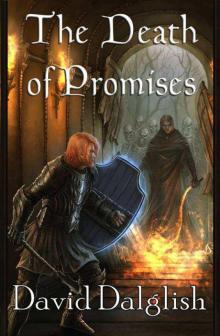 The Death of Promises (Half-Orcs Book 3)
The Death of Promises (Half-Orcs Book 3)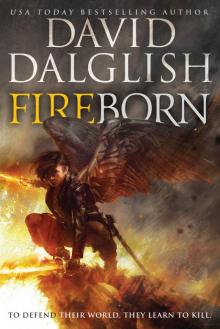 Fireborn
Fireborn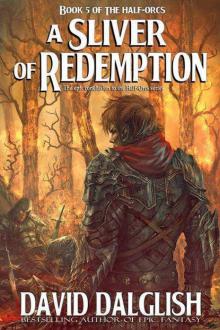 A Sliver of Redemption h-5
A Sliver of Redemption h-5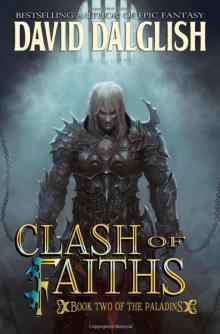 Paladins 02 - Clash of Faiths
Paladins 02 - Clash of Faiths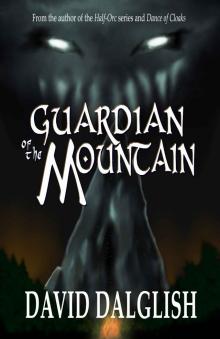 Guardian of the Mountain
Guardian of the Mountain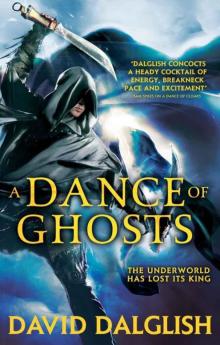 Shadowdance 05 - A Dance of Ghosts
Shadowdance 05 - A Dance of Ghosts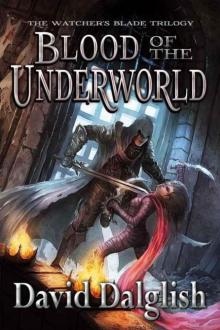 Blood of the Underworld twb-1
Blood of the Underworld twb-1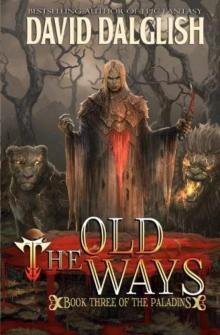 Paladins: Book 03 - The Old Ways
Paladins: Book 03 - The Old Ways Dawn of Swords
Dawn of Swords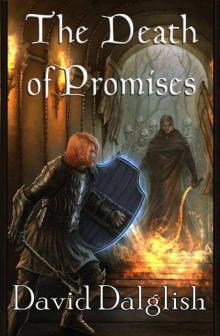 The Death of Promises h-3
The Death of Promises h-3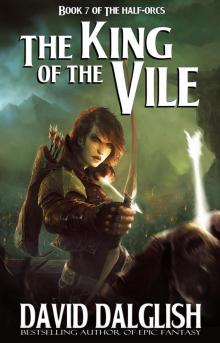 The King of the Vile
The King of the Vile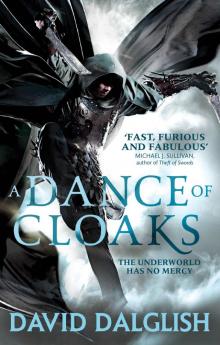 Shadowdance 01 - A Dance of Cloaks
Shadowdance 01 - A Dance of Cloaks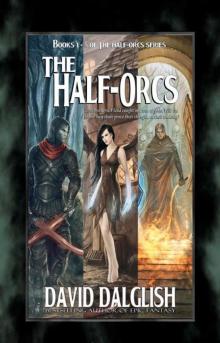 The Half-Orcs: Books 1-5
The Half-Orcs: Books 1-5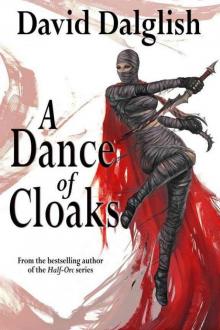 A Dance of Cloaks
A Dance of Cloaks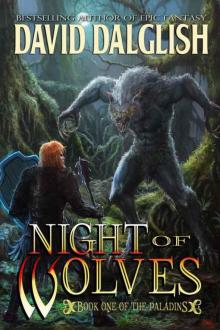 Paladins 01 - Night of Wolves
Paladins 01 - Night of Wolves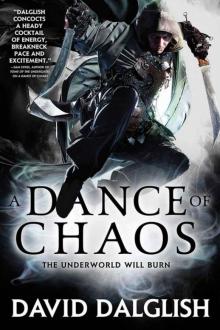 A Dance of Chaos: Book 6 of Shadowdance
A Dance of Chaos: Book 6 of Shadowdance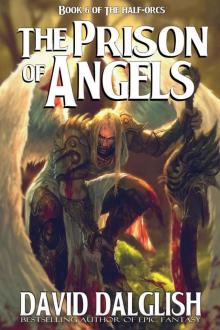 The Prison of Angels h-6
The Prison of Angels h-6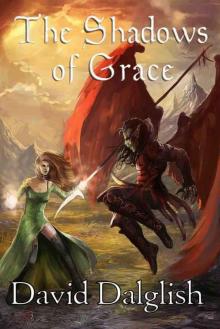 The Shadows of Grace (Half-Orcs Book 4)
The Shadows of Grace (Half-Orcs Book 4)